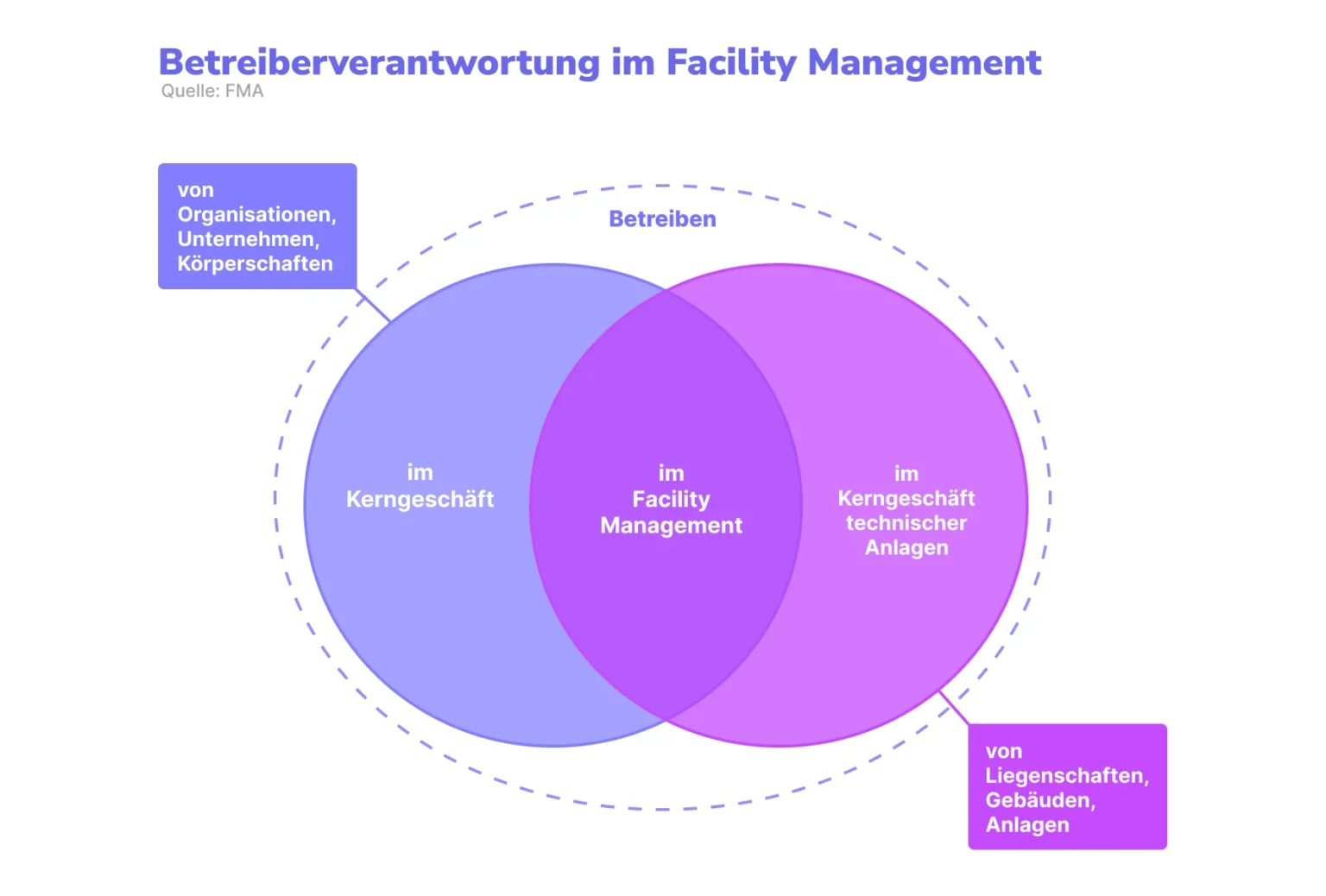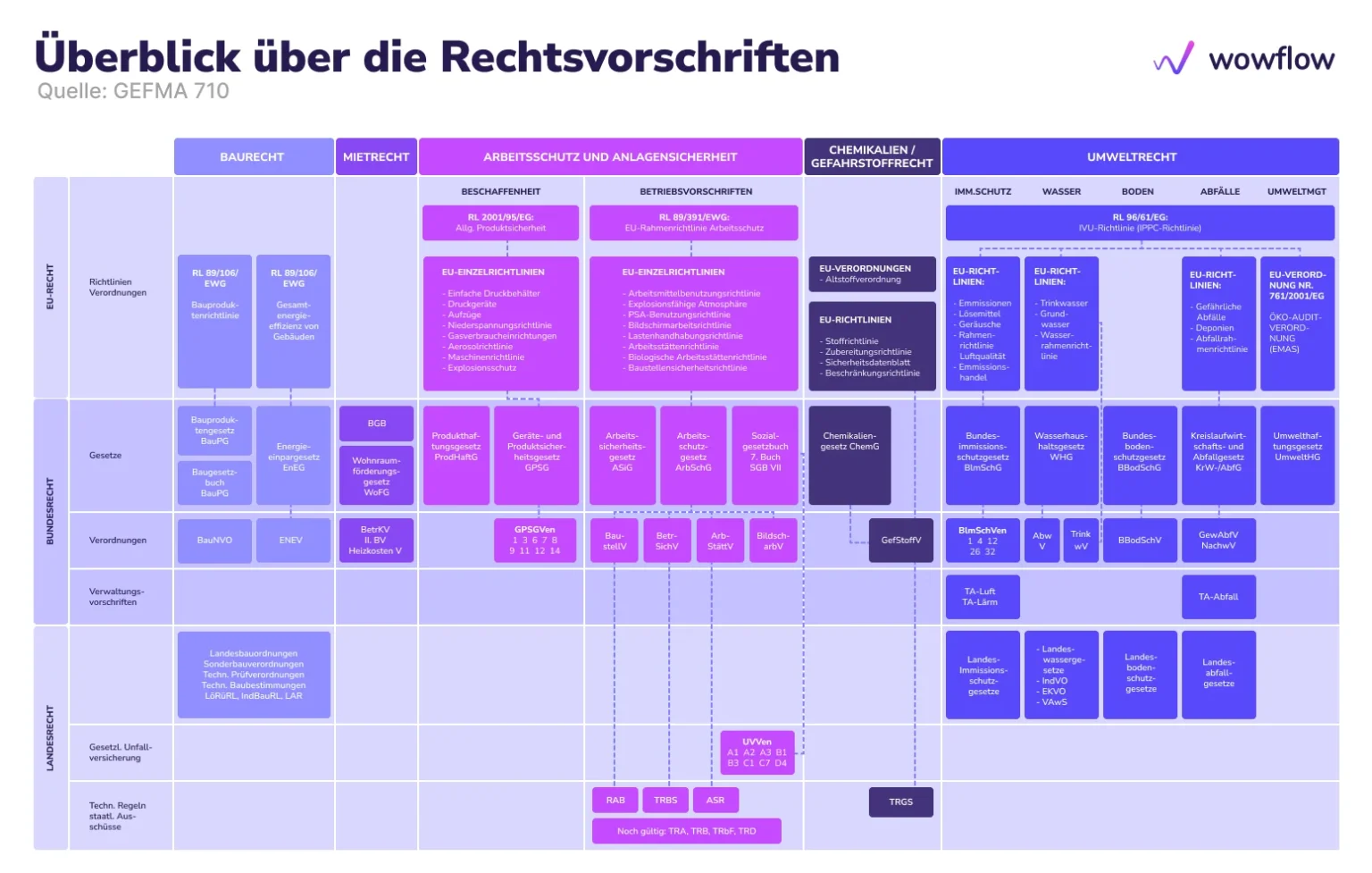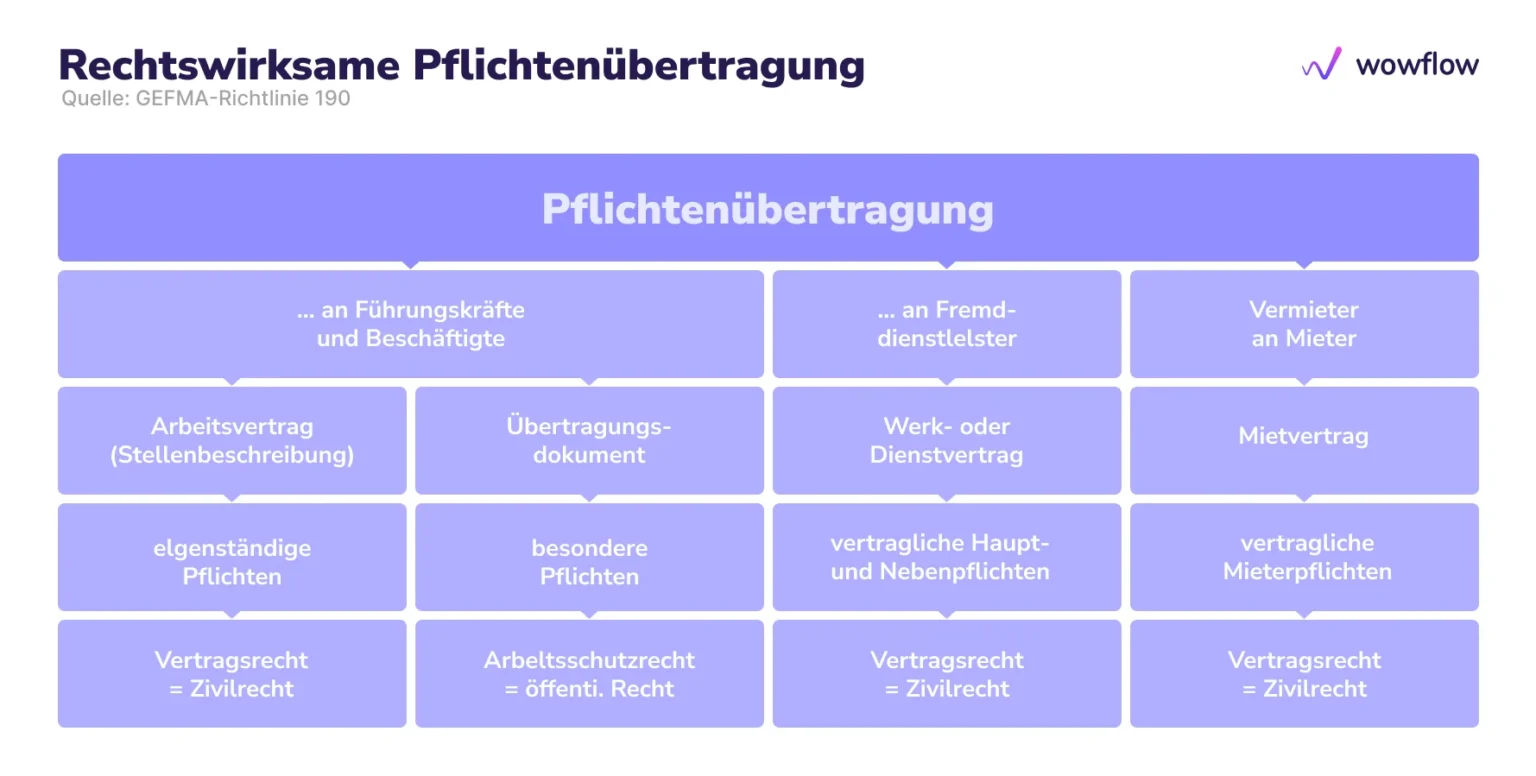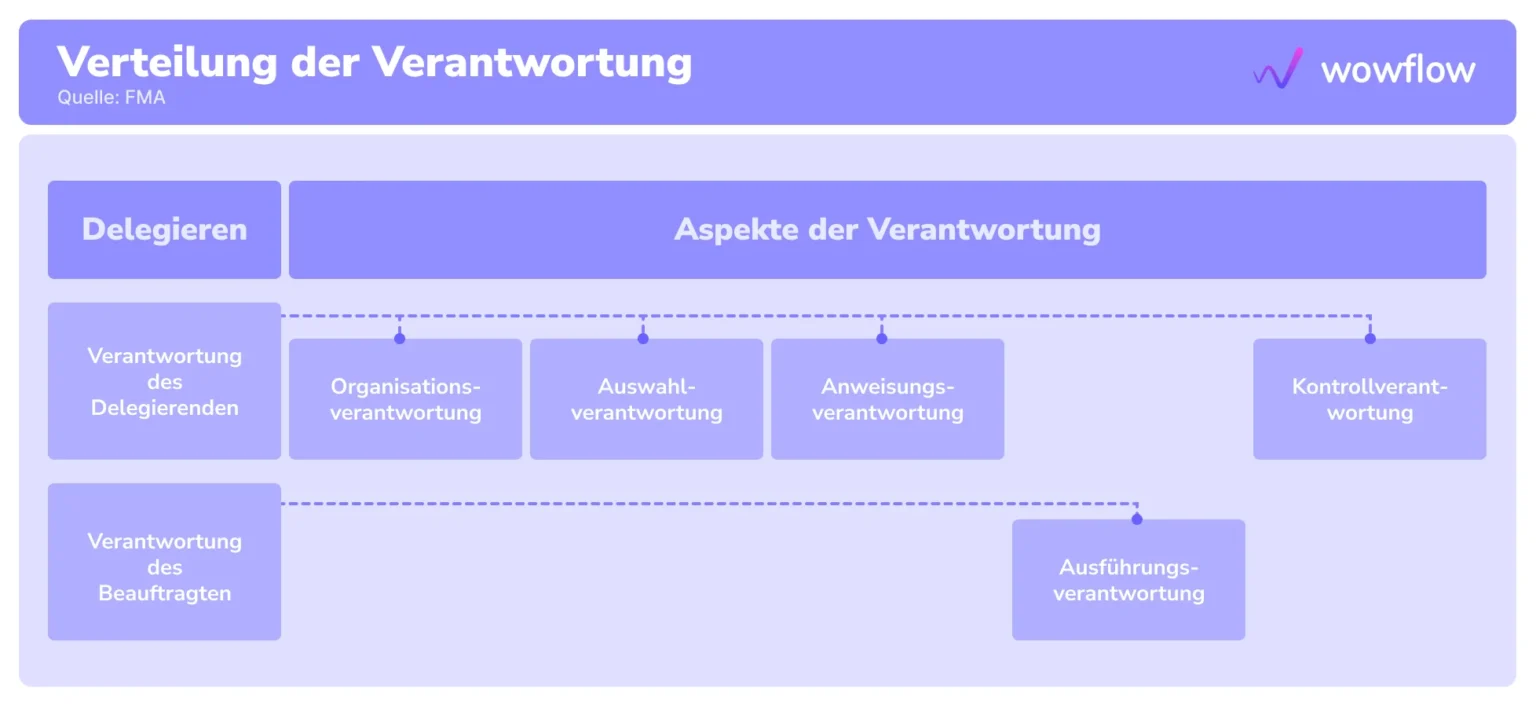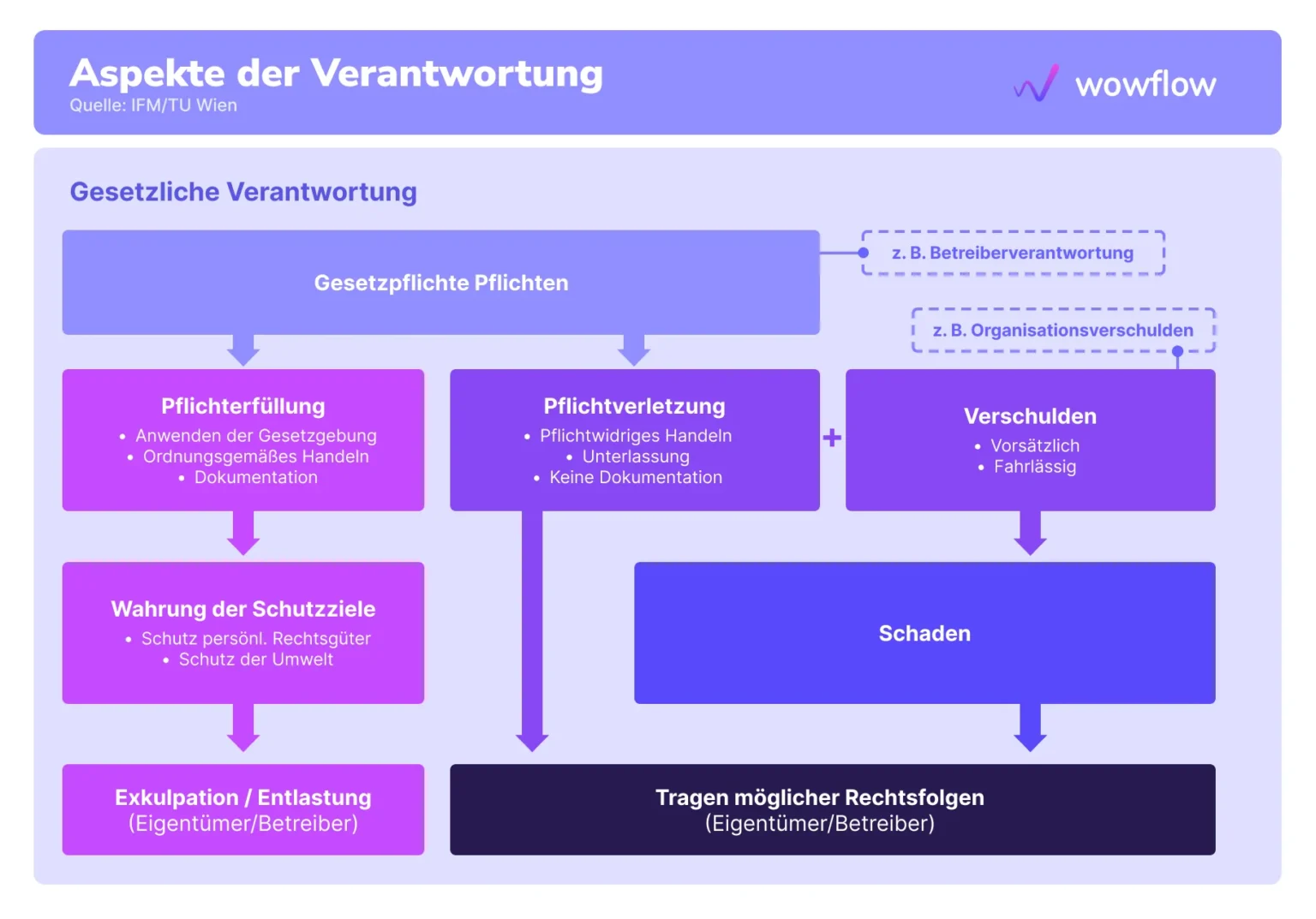How well do you know your responsibilities as an operator? Operators face strict legal obligations in the field of facility management. Yet many do not know their exact responsibilities.
In this article, we explain the various areas of operator responsibility – from building safety and occupational health to protection of the environment We also give you practical tips on how to protect yourself from a legal standpoint as an operator and present ways how to delegate tasks in a legally safe manner.
Find out now about your operator responsibilities!
List of contents
What is operator responsibility?
In facility management operating with assets and real estate is a complex matter, which involves a number of obligations. A facility, along with its assets and equipment, presents a number of possible hazards.
A building operator is responsible for protecting the people, property and the environment from all of these hazards. These duties are part of operator’s responsibility.
Operator responsibility encompasses all the tasks and competencies necessary to avert any hazards and prevent damage during the property’s overall operation.
If damage occurs, it can lead to legal issues, including fines, damage claims or even criminal prosecution.
Operator responsibility is there to provide legal protection for the company.
Who bears operational responsibility?
The following are considered as operators according to the VDI 3810 Guidelines, Sheet 1:“All individuals or organizations who are in charge of assets or facilities and are in a decision-making position in regard to the safety of those assets or facilities.”
Here, it is important to note that an operator does not necessarily have to be the owner of the asset. Tenants or leaseholders may also be considered operators and therefore carry operator responsibility.
Operators might include, for example:
- Owners
- Landlords
- Managing Directors
- Proprietors
- Executives
- Tenants
- Employees
- Employers
- Service providers
Operator responsibility in facility Management: Why is it so important?
In accordance with GEFMA 190, complying with operator responsibilities is an integral part of modern facility management.
Despite not being new to facility management, operator obligations remain a challenge for many responsible parties.
Generally, operators’ lack of knowledge about legal obligations makes it difficult for them to act in a lawful manner.
This often leads to legal violations within the company. Some examples of non-compliance include exceeding noise limits due to loud equipment, inadequate accessibility for people with disabilities, absence of handrails on staircases, incorrect or improper labelling of hazardous areas, etc.
Legal consequences for faulty safety of operation
If any of the violations results in an accident, the problem becomes even worse.
Facility managers, department heads or other responsible parties may be held personally and even criminally liable in the event of accidents involving personal injury. Unfortunately, awareness often comes when it is already too late.
Therefore, it is of utmost importance to understand the basic objective in operator’s obligations fulfilment, which is protecting the organisation from claims by injured parties.
Operators of buildings and facilities need to know their obligations, in order to identify risks at an early stage.
Fulfilling your operator responsibilities: 3 tips for optimal implementation
In day-to-day operations, operator responsibility is established by a variety of instructions, regulations and other provisions.
The following table from the GEFMA provides an overview of the numerous legal requirements:
Despite the complexity of this issue, there are only three steps we recommend in order to ensure you fulfil all your operator responsibilities.
1. Keep your asset management documentation up to date.
The asset management documentationin building management ensures the building owner’s protection under liability law and compliance with legal regulations.
It is particularly important to have complete equipment documentation, which serves as proof of compliance with fire protection standards as well as other safety measures.
Wowflow offers a range of features, for example automated reporting, that ensure proper facility documentation is in place. All information is traceable and available to you at any time in the event of an inspection. Find out more about it here!
2. Understand which regulations are relevant to the operator's responsibility for buildings and technical assets
Norms and standards are at the heart of operational safety, as well as the planning and implementation of proper maintenance in facility management. The VDI 3810 guidelines, for instance, are particularly important for operators. They contain essential technical specifications and regulations for safe building operation.
The following regulations are particularly essential for buildings and technical assets:
- Occupational Health and Safety Act (ArbSchutzG)
- Workplace Ordinance (ArbStättV)
- Ordinance on Industrial Safety and Health (BetrSichV)
- Technical standards and regulations (VDI 3810)
In addition to this, it is the operator’s responsibility to look after and monitor the following assets with particular care:
- Hydraulic installations
- Heating systems
- Ventilation systems
- Facility automation systems
- Passenger and freight elevators
3. Ensuring proper operator responsibility delegation
Transfer of responsibilities through delegation is an essential tool for fulfilling legal responsibilities.
A common way of doing this is through a facility management contract.
Maintaining IT infrastructure, repairing HVAC systems,facility cleaning: Most operators are unable to complete these tasks on their own, so they partner with service providers.
Yet efficient task delegation to internal managers, staff, or external service providers requires following a series of basic rules.
To ensure a legally effective transfer of duties, the transfer must be made in writing in accordance with Section 13(2) of the Occupational Health and Safety Act. For new hires, this is done, for example, through an employment contract or via the job description.
- Recruiting staff in facility management:Finding talent for efficient facility management teams.
The table below displays potential forms of written transfer of responsibilities which are compliant with the Occupational Safety and Health Act:
Is a complete transfer of responsibilities possible?
It is important to note that a complete transfer of duties is not possible in principle, so part of the responsibility will always remain with the owner/operator.
The following responsibilities are not transferable:
- Choice liability: The operator must select those entrusted with the operator’s duties carefully to establish whether they are qualified for the job.
- Organizational responsibility: The operator needs to establish and record the specific facility management responsibilities assigned to the operator. Performance of these tasks must be clearly documented.
- Instructional responsibility: The operator must ensure that the recipient has all the competences and means to carry out the operator obligations. He must instruct and train the recipient. This also needs to be well documented.
- Responsibility for control: The operator must consistently supervise the operator and control the fulfilment of his obligations. Important: This cannot be delegated to a third party.
With Wowflow, task delegation becomes effortless. Real-time monitoring and automatic updates – even for jobs assigned to third-party service providers. Find out more!
Failure to comply with the conditions for passing on operator responsibilities could be legally classified as an organisational oversight, rendering the operator liable in the event of a damage claim.
You can prevent this situation by following the delegation procedure as well as documenting the entire process.
Wowflow streamlines the documentation process. Generate image-based evidence with just a few clicks. Create your free account now!
Where can you find an operator responsibility checklist?
Unfortunately, the complexity of the subject and the individual nature of each company make it impossible to provide a general checklist for operator liability. For example, in a sports hall, you need to consider different safety issues when maintaining equipment than in a factory where a lot of chemicals are being handled.
Each company must comply with the specific rules and regulations that apply to its industry. In the case of the factory, this would include regulations on the handling and storage of chemicals. These are based on the regulations of the Chemicals Regulations.
Any workplace that involves manufacturing, factory production or any other industrial process carries a certain degree of risk: if an accident occurs, people, the environment or property may be damaged. This risk is greater in the chemical and pharmaceutical sector compared to other industries.
These companies have to deal closely with environmental issues, in particular the protection of air, soil and water.
This means that the operator is also responsible for nature and climate protection as well as criminal offences: if, for instance, chemicals are released into the environment and cause damage, the operator is held responsible.
Summary
Operator responsibility is a key aspect of running a company or organization.
Operator responsibility is not just about complying with legal regulations, but also about taking proactive measures in order to prevent risks. From staff safety to tasks delegation – it’s all part of operational responsibility.
Important measures include the creation of high quality asset documentation as well as raising safety awareness in facility management.
Meeting your operator obligations ensures safe and sustainable operation This will safeguard your company’s core business against potential legal consequences.
In addition to satisfying your legal responsibilities, professional operator responsibility has many benefits for the company itself.
A safe and responsible operation creates trust among customers, partners and employees.
This can result in good reputation, which in turn helps the growth and success of the company.
FAQ
Who bears operator responsibility?
The official definition of an operator is “anyone who has the actual or legal ability to make the necessary decisions with regard to the safety of the facility” (source: Ordinance on Industrial Safety and Health). So, this question goes beyond mere ownership. You decide what happens on-site? Then you are also held responsible!
Operator responsibility: When does the operator become liable?
If the operator fails to meet their obligations, they may face legal liability and criminal consequences.
In the event of damage, the operator has to prove that all necessary measures were taken to prevent the damage. This is where documentation plays an essential role.
Is the operator the same as the owner?
In a legal context, the proprietor may not necessarily be the operator. However, just as with a vehicle driven by another person, the question of the owner’s liability may arise in the event of damage.

Facility management software Wowflow saves up to 30% of administrative workload for Phrixus Croatia
“Wowflow is the best FM software ever!” Ivica Grgic, Facilities Manager Company Phrixus d.o.o. is a company whose main activity is the provision of services

From Frustration To Fortune: Our Journey To Discovering The Game-Changing Facility Management Software
“Some of our clients were hesitant about adopting this new software. But after a quick demonstration, all doubts vanished. Nobody expected it to be that

Municipality of Lana has real-time overview of facility management with Wowflow
“When I became in charge of facility management for the Municipality of Lana in 2020, I started looking for the right tool. Many options were

